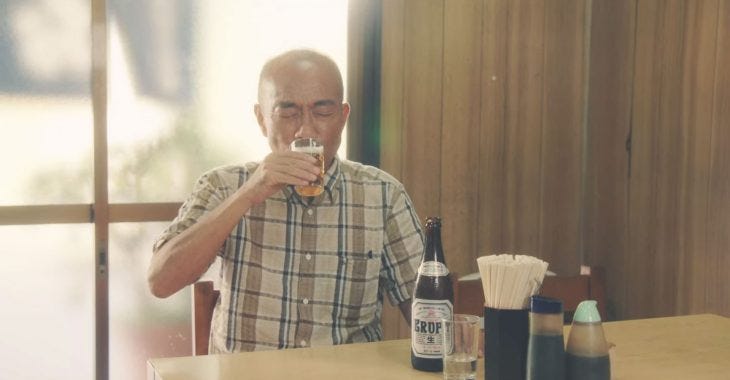You'd think that with my obsession with food, I shouldn't run out of food-related Netflix shows to watch and write about. Wrong. Food-related shows on Netflix are reality shows more often than not and, with very few exceptions, I don't watch reality shows. One exception was Ugly Delicious which, sadly, didn't get farther than a short second season. Host David Chang has since jumped into the guest-a-celebrity formula with Breakfast, Lunch, and Dinner so I guess it's safe to say that I won't be seeing more of him.
I'd rather watch food shows with substance. Like Taco Chronicles. Or not-really-food-shows that make you remember the food scenes anyway. Like Samurai Gourmet — the TV series that spawned a culinary travel blog. Despite the word "gourmet" in the title, Samurai Gourmet does not involve any cooking competition. And despite the word "samurai", there are no ninjas and swordfights in the show either.
Samurai Gourmet is a Japanese series (English subs avilable on Netflix) about 60-year-old newly-retired Takeshi Kasumi who, unsure of how he should spend his empty days, embarks on a daily adventure of self-discovery that always involves food. From the simple act of enjoying cold beer at midday (something he never indulged in during the decades that he was a corporate employee) to trying unfamiliar dishes, Kasumi's daily adventures are told languorously in pace and scenery.
The dreamy mood only gets interrupted with the appearance of the brash samurai whose presence and significance may be a little hard to appreciate unless you're Asian and used to storytelling the Asian way. The Guardian, for instance, got it wrong when it said that the show is where "an old Japanese man asks an imaginary samurai to help him navigate his life problems". Meanwhile, The Thrillist described the samurai as Kasumi's vision — an alter ego from whom Kasumi gets his cues. Oh, no! No, no, no...
Episode 1 explains very clearly what the samurai is. Kasumi orders lunch in a restaurant and, while waiting for his food, debates whether he should have a beer. On a weekday. At midday. In all of the 38 years when he was working, he never did that. He feels guilty but tries to muster courage when he says to himself, "If I were a samurai, I would drink in the middle of the day without any guilt." And that's when the samurai makes his first appearance.
A samurai — sword, pony tail, the works — walks in, orders sake and starts gulping down the rice wine. The other diners are transformed into "employed samurai", they have something nasty to say about the newcomer drinking in the middle of the day and calls him a failure. And the newcomer remarks as he half-glances at the gossipy diners, "Sake is best in the afternoon. Not being able to do that... Being an employed samurai must be tough."
And it's very clear what the samurai is. The roaming samurai — unemployed, living freely, coming and going as he pleases — represents a part of Kasumi's persona that, until he retired and found freedom, stayed deeply hidden. The samurai is not a figment of the imagination of an old man but, rather, a part of his soul, so to speak, that did not dare manifest itself in Kasumi's old life but which showed up with alacrity when summoned quite wistfully ("If I were a samurai...").
The samurai is Kasumi learning to embrace, little by little, the wholeness of himself — free, daring, able to perceive life and the world (represented by food) from a wholly new perspective, and able to shake off the narrowness of traditional thinking and the guilt inflicted by social expectations.
Samurai Gourmet is nostalgic, often funny and always filled with delectable food scenes. I especially love the lengthy food shots in Episode 4 ("Yakiniku Her Way") and Episode 10 ("Anniversay Oden"). I first saw Samurai Gourmet back in 2018, and I rewatched all the episodes recently. Still delightful. Still mouthwatering. Still so insightful.



